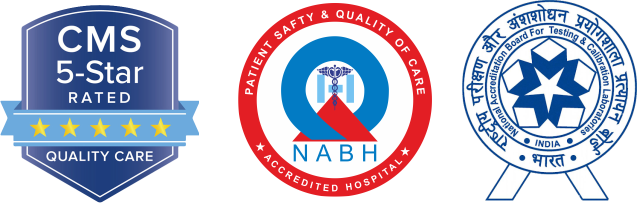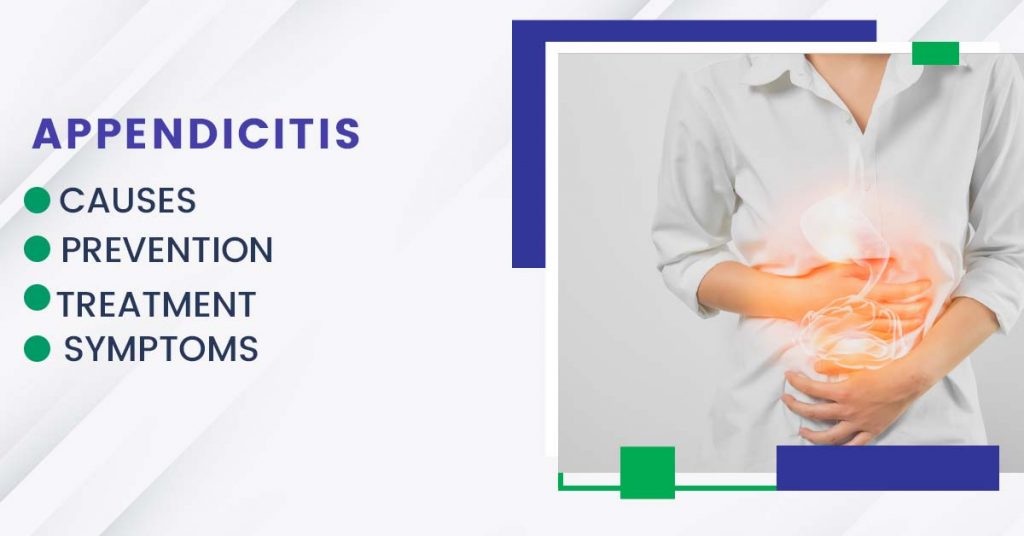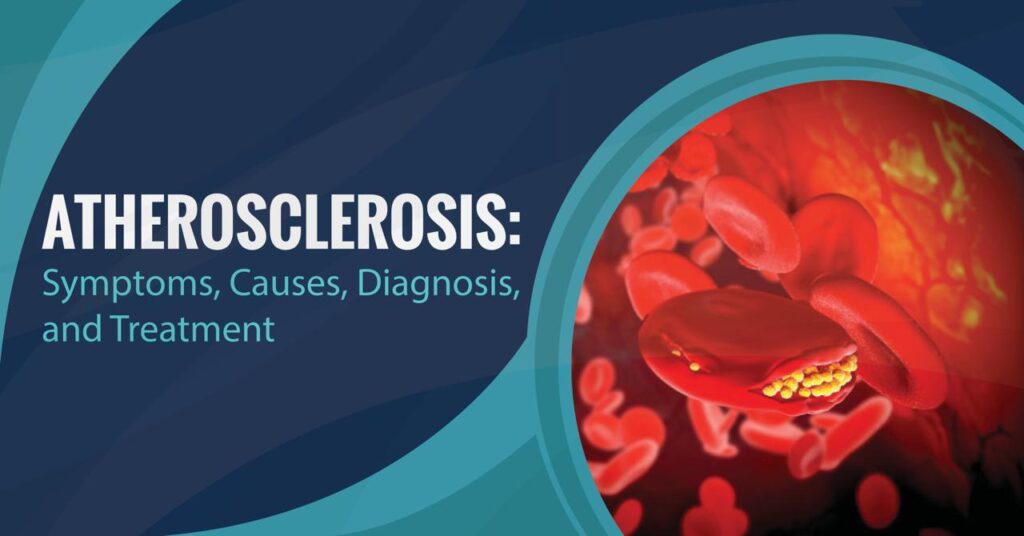What is Appendicitis?
On the right side of the abdomen, there is a tiny finger-shaped tubular organ called the appendix. Although it is a vestige of an organ, it is a part of our digestive system. Appendicitis can result from an obstruction in the appendix.
Appendicitis is an inflammation of the appendix, a finger-shaped pouch on the right side of the abdomen that arises from the colon. The lower right abdomen is painful if you have appendicitis. However, for the majority of patients, the pain starts near the navel and spreads. Appendicitis pain often intensifies and finally becomes unbearable as the inflammation develops.
It most commonly affects adults between 10 and 30 years of age, but it can affect anyone. The appendix is typically surgically removed as part of standard care.
Types of Appendicitis
Acute appendicitis:
Appendicitis that occurs suddenly and severely is known as acute appendicitis. Males are more prone to it than females, and it most frequently affects kids and young people between the ages of 10 and 30. For 24 hours, pain frequently starts mild and quickly gets worse.
It needs emergency medical attention. If left untreated, it may lead to the rupture of the appendix. We are dealing with a potentially lethal issue. About 7 to 9 percent of all Americans will experience acute appendicitis in their lifetime, which is more prevalent than chronic appendicitis.
Chronic appendicitis:
Less frequently than acute appendicitis, chronic appendicitis. People with chronic appendicitis are only likely to experience it in 1.5% of cases.
There are a variety of symptoms of chronic appendicitis, and these are generally associated with episodes of acute appendicitis. Weeks, months, or even years may pass before symptoms vanish again. Appendicitis of this type is usually difficult to diagnose. Appendicitis is sometimes not diagnosed until the condition has progressed to the acute stages.
Symptoms of Appendicitis
Appendicitis is characterized by severe abdominal pain, particularly in the lower right abdomen, which is where the appendix is located.
Symptoms frequently start unexpectedly and worsen. They consist of:
- Coughing, sneezing, breathing in, or moving causes abdominal discomfort or soreness.
- Swollen belly.
- Inability to pass gas.
- Feeling less hungry than usual (reduced appetite).
- Low-grade fever (below 100 degrees F).
- Nausea and vomiting.
Causes of Appendicitis
Appendicitis’ precise cause is frequently unknown. According to experts, it arises when a portion of the appendix becomes clogged or obstructed.
Your appendix may get blocked for a variety of reasons, including:
- a buildup of hardened stool
- enlarged lymphoid follicles
- intestinal worms
- traumatic injury
- tumors
Risk Factors of Appendicitis
In the world, appendicitis is one of the most prevalent diseases. Although anyone can have this illness at any moment, appendicitis in children under two years of age is uncommon. Most cases affect people between the ages of 10 and 30. The next paragraphs cover a few of the typical appendicitis complications and risk factors.
- Ruptured appendix: With a ruptured appendix, this issue becomes more complicated. In this situation, a rupture causes infection to spread throughout your abdomen, necessitating immediate surgery.
- Peritonitis: When your appendix bursts, microorganisms are released into your abdominal cavity. Your abdominal cavity’s lining develops an infection and inflammation. It may result in a high fever, difficulty breathing, and excruciating stomach discomfort.
- Abscess: An infection results from the appendix bursting inside your abdomen (abscess). It causes an uncomfortable pus pocket to form nearby. A catheter will be inserted through your abdominal wall by a surgeon to drain the abscess.
- Sepsis: Your bloodstream may allow a burst abscess to spread to other bodily areas. Sepsis is a devastating illness, although uncommon. It may result in a fever, mental disorientation, fatigue, and shortness of breath.
You can Read Also: Hepatitis: What are Hepatitis, Types, Symptoms, Causes, and Treatment
Diagnosis of Appendicitis
Appendicitis can be difficult to diagnose. Many times, the symptoms of an illness, such as gallbladder issues, bladder or urinary tract infections, Crohn’s disease, gastritis, kidney stones, intestinal infection, and ovary issues, are vague or resemble those of other conditions.
Appendicitis can be identified using these tests:
- Blood tests: Complete blood count is frequently advised by doctors (CBC). To do this, a medical practitioner will take blood samples from your veins and send them to a lab for analysis. It aids in identifying any bacterial infections that may coexist with appendicitis. Additionally, you might be required to have a C-reactive protein test to rule out any additional potential reasons for your appendix inflammation.
- Urine test: Urinalysis requests from doctors are possible. It is done to rule out the chance that your symptoms are being caused by a kidney stone or urinary tract infection. Your urine samples will be sent to a lab for analysis.
- Abdominal imaging tests: To evaluate the inflammation of your appendix, doctors will most likely perform imaging studies of your abdomen. For this, they request tests such as a stomach MRI, CT scan, ultrasound, or X-ray. These aid in the diagnosis of inflammatory bowel illness, faecal impaction, and abscess. Before taking these examinations, you might need to fast.
- Chest imaging tests: Frequently, lower respiratory infections like pneumonia can mimic the signs and symptoms of appendicitis. To rule out this possibility, doctors could request a chest X-ray. They can get a clear picture of the state of your lungs thanks to a CT scan.
- Pelvic exam: Your symptoms may be brought on by pelvic inflammatory disease, an ovarian cyst, or another disorder affecting your reproductive organs if you were born a girl. Your doctor might conduct a pelvic exam to look at your reproductive system. They will visually examine your cervix, vulva, and vagina during this examination. Additionally, they will physically examine your uterus and ovaries. They might take a tissue sample for analysis.
- Pregnancy test: Ectopic pregnancies have occasionally been misdiagnosed for appendicitis in the past. If a fertilised egg instals itself in a fallopian tube rather than the uterus, it takes place. To rule out this possibility, the doctors can ask you to submit to a urine or blood pregnancy test.
Complications of Appendicitis
An infected appendix will eventually burst, releasing bacteria and other debris into your abdominal cavity, which is where your liver, stomach, and intestines are located in the middle of your body. Peritonitis, a severe inflammation of the lining of the abdominal cavity, may result from this (the peritoneum). If not treated swiftly with potent antibiotics and surgery to remove the pus, it can be fatal.
An abscess can occasionally develop outside of an inflamed appendix. The appendix is then “walled off” from the rest of your organs by scar tissue. As a result, the virus doesn’t spread. However, an infected appendix may tear, which can cause peritonitis.
Treatment of Appendicitis
A procedure to remove the inflamed appendix, often known as an appendectomy or appendicectomy, is the primary treatment for appendicitis. The body may survive without an appendix and still function normally.
One of two methods can be used to remove the appendix:
- Through a small telescope, laparoscopic (or “keyhole”) surgery is performed.
- There will be 3 little keyhole wounds that are open, each measuring between 1 and 2 cm long. One of the cuts will be on the right lower abdomen.
The type of operation, the patient’s general condition, and whether or not the appendix has ruptured all affect how long it will take to recover after surgery. The majority of folks heal without too many issues. The wound may occasionally become infected and require further medical attention.
You can Read Also: Arrhythmia: Symptoms, Types, Causes, Treatment, and Prevention
When the appendix is removed and later discovered to be normal and not inflamed, this usually indicates that there is another cause for the symptoms that are consistent with appendicitis. Your doctor can suggest checking for a different problem-causing factor. Your surgeon may advise modest exercise for a few weeks following surgery to allow the surgical wound to heal.
Although surgery is the primary treatment for appendicitis, antibiotics may also be employed on occasion. They are not always effective. If surgery is delayed, such as if you have to travel a considerable distance to undergo the procedure, or for patients who are unsuitable for surgery, such as being too fragile, antibiotics may be administered. Before surgery, your doctor could advise taking antibiotics to lower the chance of infection.
Prevention of Appendicitis
Although appendicitis may not be preventable, making healthy decisions and adopting good habits might assist.
Foods you should eat:
Foods high in fibre are advised since having appendicitis seems less likely if you consume a diet high in fibre. So, incorporate the following foods into your diet:
- Over morning cereals, choose oats or wheat groats
- substituting whole wheat flour for all-purpose flour
- instead of white rice, use brown rice
- Dessert with fresh fruit
Foods to avoid:
- Foods that have been processed, fried, or junk food is fatty and may aggravate the digestive tract.
- In addition to damaging the liver, alcohol affects digestion as well.
- The fat content of red meat makes it difficult to digest.
- Typical sugary foods include cakes and pastries.









